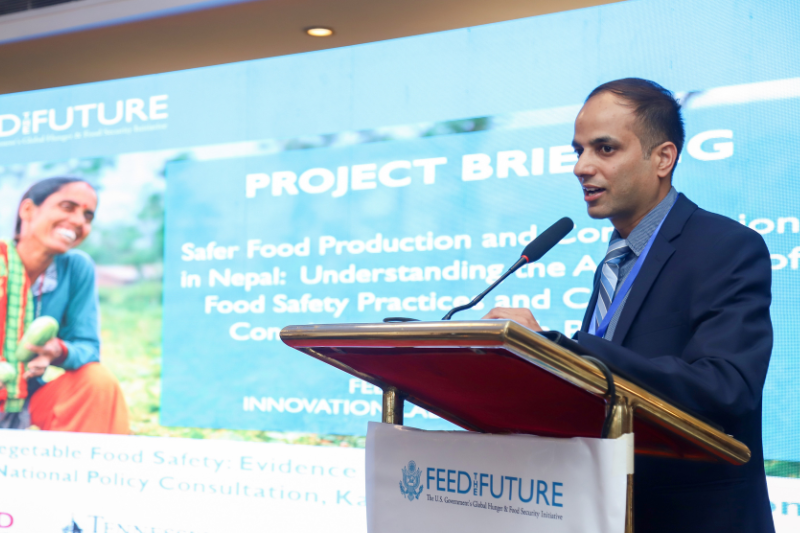
In April, more than 135 food system stakeholders gathered in Kathmandu for a national policy consultation to discuss opportunities to strengthen produce safety in Nepal. The group’s recommendations were captured in a draft resolution which will be shared with the government representatives charged with developing strategies to implement a new, more stringent food safety law.
“Food safety is pivotal to building a sustainable food system in Nepal and supporting a well-nourished population,” said Aditya Khanal, associate professor and agricultural economist at Tennessee State University. “And while Nepal has enacted numerous policy initiatives to strengthen food safety systems, microbial foodborne pathogens—particularly in fruits and vegetables—have received less attention than chemical contaminants and physical hazards.”
The meeting was organized by Agriculture and Forestry University (AFU), the Nepal Food Scientists and Technologists Association, Tennessee State University, and the Feed the Future Innovation Lab for Food Safety (FSIL), which funded Khanal’s two-year project on Nepali food safety economics and microbial food safety. In convening the event, the organizers hoped to foster discussion about existing data, identify persistent knowledge gaps, and support informed decision-making in the food safety policy landscape.
“In May, the Nepal National Assembly approved the Food Hygiene and Quality Bill and is expected to draft a strategy to put this new bill into practice,” said Ram Hari Timilsina, FSIL project co-PI and associate professor in the Department of Agricultural Extension and Rural Sociology at AFU. “Our FSIL project findings will be very supportive of these efforts, so it was timely to share them with policymakers and other relevant stakeholders.”
The meeting attracted a broad range of stakeholders including representatives from federal, provincial, and local government, the private sector, farmers, extension agents, consumers, researchers, universities, and non-governmental organizations. The first panel discussion featured results from the FSIL project in Nepal, including water contamination rates on farms and in households, evidence for consumer and grower support for safer food, gender dynamics that could affect food safety initiatives, and project recommendations. A project brief with the recommendations is available in Nepali and English.
“It was rewarding to share our findings and evidence-based recommendations and receive positive feedback from stakeholders,” said Khanal. “Our research, notably the studies on risk indicators in water sources in fresh produce and the food safety behaviors of consumers and producers, using nationally representative data, was marked as very timely. During the panel discussions and Q&A sessions, participants showed keen interest in the findings and contextualizing them at the local, regional, and national levels.”
Subsequent sessions focused on the status of food safety in Nepal, data and evidence needed to inform policy, and generating advocacy and awareness about food safety. The meeting culminated in a session that synthesized the day’s debate and discussion for a draft resolution that will be circulated among Nepali authorities with oversight over aspects of food safety.
Key points include:
- The recognition that food safety is a human right;
- The acknowledgment of the multidimensional nature of food safety, including chemical, physical, and microbial hazards and diverse stakeholders in the private, government, and consumer sectors;
- The identification of specific challenges to food safety, such as low consumer food safety awareness, the risk of contamination in produce from poor quality agricultural and household water, the need for food safety testing infrastructure, and the harmonization of national and international food safety standards; and
- The potential for Nepal to leapfrog ahead in food safety using rapid digital diagnostic techniques and genomics.
- The draft resolution also emphasizes the need to prioritize the food safety awareness and training of women, who play important roles in food handling, and the value of cross-sectoral partnerships. In the future, the resolution recommends exploring financial and technical support to assist farmers in adopting Good Agricultural Practices (GAPs) for adhering to safer production and becoming NepalGAPs certified.
“The meeting was a valuable opportunity to sensitize stakeholders to the importance of microbiological food safety in fresh produce,” said Timilsina. “To build on this, it is vital that we collaborate across sectors to develop and implement educational programs at the grassroots level for farmers and develop the infrastructure and legal provisions for effective implementation of the recent bill.”

